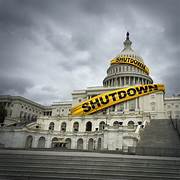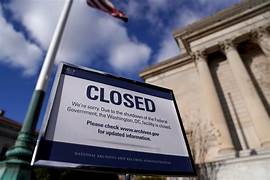As the political drama unfolds in Washington, the phrase “government shutdown” is once again making headlines across the country. In 2025, Americans are facing the threat—or the reality—of another federal government shutdown, with massive consequences for workers, families, and the economy.
But what exactly is a government shutdown? Why does it happen so often? And what makes the 2025 situation particularly important? This article breaks it all down in simple terms.
🏛️ What Is a Government Shutdown?
A government shutdown happens when Congress fails to pass legislation to fund federal government operations and agencies. In the U.S., the federal budget must be approved each year, and if lawmakers can’t agree on how to spend money, the government literally runs out of funding.
When a shutdown occurs:
- Non-essential federal services pause
- Federal employees are furloughed or work without pay
- National parks, museums, and agencies may close
- Delays hit government benefits, tax services, passports, and more
It’s like the government “closes for business,” but only partly—essential operations like military defense, air traffic control, and law enforcement continue running.
🗓️ Why Is There a Shutdown in 2025?
As of mid-2025, budget negotiations between Republicans and Democrats have stalled again. The House of Representatives and the Senate are locked in a partisan battle over key issues like:
- Defense spending
- Border security
- Climate change funding
- Social programs (like Medicare, SNAP)
- Debt ceiling enforcement
- Ukraine and foreign aid
The fight isn’t just about numbers—it’s about ideological differences between parties. Conservative lawmakers are pushing for deep spending cuts and stricter immigration policies, while progressives are fighting to protect social services, climate action, and healthcare.
The deadline to pass a budget or continuing resolution (CR) has passed, and now, a partial or full shutdown has taken place.
📉 What Happens During the 2025 Shutdown?
Depending on how long the shutdown lasts, the effects could range from annoying to severe. Here’s what we know so far:
✅ What Stays Open (Essential Services)
- Military operations
- TSA and air traffic control
- Border patrol and customs
- Law enforcement (FBI, DEA, etc.)
- Emergency healthcare (VA hospitals, Medicare claims)
❌ What Closes or Gets Delayed
- National parks and monuments
- IRS services (refunds, audits, customer service)
- Visa and passport processing
- Small business loan processing
- Research agencies (NIH, NASA)
- Federal employee paychecks
💼 How Many People Are Affected?
Over 2 million federal employees and contractors are directly impacted by a government shutdown. During previous shutdowns:
- Hundreds of thousands were furloughed
- Military families experienced paycheck delays
- Federal workers had to work without pay, depending on back pay after the shutdown ends
In 2025, it’s expected that around 800,000 workers are immediately affected.
And it doesn’t stop there. When the government stops paying people, that money doesn’t go into local economies—which means small businesses, restaurants, landlords, and communities suffer too.
💸 Impact on the U.S. Economy
Every day the government is shut down costs the country millions of dollars. According to past estimates by the Congressional Budget Office:
- A 3-week shutdown can cost over $3 billion in lost GDP
- Government contractors lose revenue
- Financial markets grow more volatile
- Consumer confidence declines
In 2025, with inflation still a concern and the job market cooling, another prolonged shutdown could increase the chances of a mild recession or cause real economic hardship.
🗳️ Political Blame Game in 2025
The shutdown has quickly become a political war zone. Democrats and Republicans are blaming each other for failing to reach a compromise.
Republicans say:
- Democrats are spending recklessly on climate, welfare, and foreign wars.
- The shutdown is necessary to cut the deficit and enforce fiscal discipline.
Democrats say:
- Republicans are using the budget as a tool to force extreme policies.
- The GOP is holding the economy hostage for political gain.
Meanwhile, President Joe Biden (or his 2025 successor, depending on election outcomes) faces intense pressure to negotiate a deal that satisfies both wings of Congress.
📆 How Long Will the Shutdown Last?
That’s the big question—and nobody really knows. Previous shutdowns have lasted:
- 5 days (1995)
- 16 days (2013)
- 35 days (2018–2019 – the longest in history)
In 2025, the partisan gridlock is deeper than ever, especially if it’s an election year. Some analysts predict the shutdown could last weeks unless moderates in both parties strike a deal.
🙋♂️ How Does It Affect You?
Here’s how an average American might feel the impact:
- Federal Employee: You may not get paid on time and could be furloughed.
- Taxpayer: Expect slower IRS service and refund delays.
- Traveler: Passport and visa delays may affect trips.
- Veteran or Retiree: Some benefits may be delayed, though most are funded separately.
- Small Business Owner: SBA loans and federal contract payments may pause.
- Stock Market Investor: Increased volatility or drops due to uncertainty.
📱 How to Stay Informed
To track the shutdown in real time, follow:
- White House briefings
- C-SPAN and major news outlets
- Government agency websites (like IRS.gov or TSA.gov)
- Your local representatives’ social media
🔮 What Happens After the Shutdown Ends?
When Congress eventually reaches an agreement:
- Workers typically receive back pay (though contractors might not).
- Agencies resume normal operations.
- Lawmakers declare political “victory”—but the cycle often repeats.
The real question becomes: What have we learned from it? And will Congress pass reforms to avoid the next crisis?
🧠 Final Thoughts: What the 2025 Shutdown Teaches Us
The 2025 government shutdown is more than a budget dispute—it’s a reflection of deep political divisions in America. While most Americans just want government to function, their representatives are playing high-stakes poker with national operations, livelihoods, and public trust.
Shutdowns don’t save money. They hurt families, stall progress, and weaken public confidence. Hopefully, the lesson from this latest episode is that compromise isn’t a weakness—it’s the foundation of a functioning democracy.

Government Shutdown 2025: All You Need to Know
The U.S. government is once again in a shutdown crisis in 2025, and millions of Americans are feeling the effects. From federal workers missing paychecks to public services being paused, the situation is serious. Let’s break it down clearly:
❓ Why Is the U.S. Government Shutting Down in 2025?
A government shutdown happens when Congress fails to pass a funding bill before the fiscal deadline. In 2025, the two major political parties—Democrats and Republicans—couldn’t agree on key spending issues. These include:
- Military and defense budgets
- Immigration and border security
- Healthcare and Medicare funding
- Climate change and clean energy investments
- Ukraine aid and foreign policy costs
Some conservative lawmakers are demanding deep spending cuts and refusing to approve any budget unless their demands are met. On the other hand, progressives are fighting to protect key social programs. This political standoff has caused the shutdown.
⏳ How Long Will the 2025 Government Shutdown Last?
No one knows exactly how long the shutdown will last—it depends on how quickly Congress can reach a compromise. Past shutdowns have lasted:
- 5 days (1995)
- 16 days (2013)
- 35 days (2018–2019)
Given the deep political divisions in 2025, some experts predict this shutdown could last weeks, especially if it’s close to an election year and lawmakers refuse to budge for political reasons.
⚙️ What Happens in a Government Shutdown?
When the government shuts down:
✅ Some services stay open:
- Military and national security operations
- Border patrol and immigration enforcement
- Emergency services
- Air traffic control (TSA, FAA)
- Medicare and Social Security (though with some delays)
❌ Many services pause or close:
- National parks and monuments
- Passport and visa applications
- IRS customer service and tax refund processing
- Small business loan programs
- Non-essential federal employee jobs
- Scientific research at NASA, NIH, etc.
👷♀️ Federal Worker Shutdown Update 2025
Federal workers are among the most affected. In 2025:
- Over 800,000 federal employees have been furloughed (sent home without pay)
- Many others are working without pay in essential roles
- Contractors may not receive any back pay at all
- Some military families are seeing delays in housing allowances and benefits
If the shutdown continues, expect morale and financial stress among government employees to rise sharply.
💸 2025 Budget Crisis in the USA: What’s the Real Issue?
At its core, the 2025 budget crisis is about control over national priorities. Lawmakers disagree on:
- How much to spend
- Where to cut
- Whether to raise or freeze the debt ceiling
- Funding foreign wars vs. domestic issues
- Economic policies during inflationary pressures
Some politicians are using the shutdown as leverage to push their agendas. Unfortunately, it’s everyday citizens and workers who suffer the consequences.
🏛️ U.S. Congress Budget Standoff: Why Can’t They Agree?
The U.S. Congress is deeply divided:
- Republican-controlled House: pushing for big budget cuts and stricter border policies
- Democrat-controlled Senate: defending social safety nets and climate spending
- The White House is caught in between, trying to avoid blame and propose compromises
Political polarization and a lack of trust make bipartisan deals harder to achieve. Both sides fear being seen as “weak” by their base voters, so they hold their ground—even if it means shutting down the government.
🧠 How to Survive a Government Shutdown (For Federal Workers & Citizens)
If you’re affected by the 2025 shutdown, here are some steps you can take:
For Federal Employees:
- Check your agency’s furlough guidance
- Apply for unemployment insurance in your state
- Contact creditors and lenders to explain missed payments
- Look into hardship relief programs (many banks offer temporary assistance)
- Seek help from your union or employee association
For General Public:
- Avoid non-essential government services like passport renewals until after the shutdown
- Plan ahead for delays in IRS, benefits, or permits
- Stay updated with news sources and official .gov websites
- If traveling, check TSA and passport delays before booking

